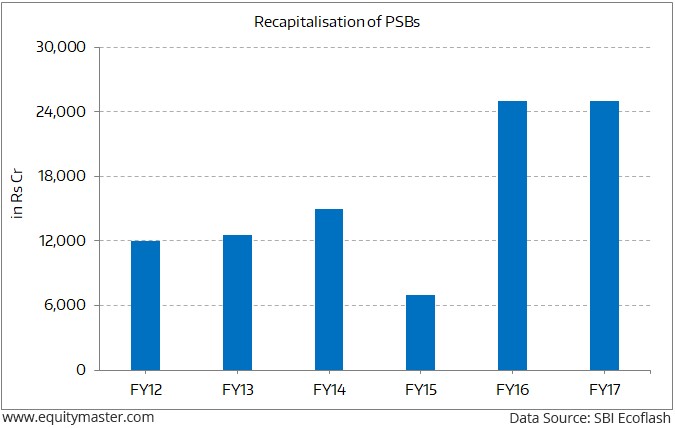Sensex Ends Marginally Higher; PSU Banks And FMCG Stocks Witness Buying
Indian share markets witnessed buying interest during closing hours and ended the day on a positive note. Gains were seen in the capital goods sector and FMCG sector.
At the closing bell, the BSE Sensex stood higher by 89 points (up 0.2%) and the NSE Nifty closed higher by 5 points. The BSE Mid Cap index closed down by 0.3%, while the BSE Small Cap index ended the day down by 0.1%.
Asian stock markets finished on a negative note as of the most recent closing prices. The Hang Seng stood lower by 0.9% and the Nikkei was trading down by 0.7%.
European markets were trading on a negative note. The FTSE 100 was down by 0.5%. The DAX was trading down by 0.6%, while the CAC 40 was down by 0.4%.
The rupee was trading at 70.03 to the US$ at the time of writing.
In the news from the telecom sector, Bharti Airtel share price was in focus today. Bharti Airtel's board of directors have approved a rights issue to the eligible shareholders for an amount up to Rs 250 billion.
Promoters of the company along with Singapore government's investment arm GIC Private Ltd will subscribe to over half of the proposed Rs 320 billion rights issue in a bid to infuse funds in the company.
As per an article in a leading financial daily, promoter Singapore Telecommunications (SingTel) will subscribe to 170 million shares in the Airtel's rights issue for a total consideration of Rs 37.5 billion.
Here's an excerpt from the article:
- The promoter and promoter group also reserves the right to subscribe either itself or through investors for additional shares in the Issue, including in the event of under-subscription by public, in accordance with the applicable laws.
The rights issue reiterates the confidence of our shareholders in the competitive strength and sound business strategy of Airtel. It shall further strengthen our balance sheet with desired financial flexibility so as to meet future opportunities, particularly in the rapidly transforming Indian mobile market.
The record fundraising plan, unveiled after the board meeting last week, comes as India's second largest phone company seeks to reduce debt and financing costs, bolster cash flows and meet capital expenditure to fight the price war unleashed by Reliance Jio Infocomm.
Over the last year, the company has been raising funds by progressively reducing its stake in its arm, Bharti Infratel share price. The company has already raised over Rs 120 billion through multiple stake dilutions.
Bharti Airtel share price ended the day down by 0.4%.
To know more about the company, you can read Bharti Airtel's latest result analysis on our website.
Moving on to the news from the banking sector, shares of public sector banks (PSBs) were trading higher today, continuing their momentum for the sixth straight day.
State bank of India (SBI), Punjab National bank (PNB), Bank of India, and Bank of Baroda were up in the range of 2% to 4%.
Reportedly, the rally was seen after the Centre announced fresh capital infusion of Rs 482 billion in PSBs.
In past one-and-half month, the Reserve Bank of India (RBI) has removed five banks - Allahabad Bank, Corporation Bank, Bank of India, Bank of Maharashtra, and Oriental Bank of Commerce from the prompt corrective action (PCA) framework, allowing them to lend freely in line with the government's objective to empower lenders so that they support economic growth.
The recapitalization announced by the government is expected to be completed by the end of FY19.
In December 2018, the government increased capital infusions for these banks for the financial year 2019 by a combined Rs 410 billion to Rs 1.1 trillion from the originally planned Rs 650 billion.
Rating agency Moody's said the capital support to state-run banks have been increased from the original plan as banks' capital shortfalls have grown larger than the initial projections.
As per the report, these banks are far from a complete turnaround as large volumes of problem-loans will still continue to cap improvements in profitability and capitalization, constraining their credit profiles.
A key hindrance to a faster turnaround of these banks is the slow progress in the resolution of legacy bad loans and the need to build up provisions against those assets.
It said farm loan waivers, which three states have granted since November 2018, are a risk because these measures can incentivise borrowers to not repay their loans, contributing to more bad loans in the agricultural lending books.
Besides vulnerabilities linger among small businesses as reflected in the spikes in bad loans.
It said the fresh capital will enable banks to use operating profit to significantly boost provisions for bad loans. It expects state-run banks' capital shortages to shrink substantially in financial year 2020 as their asset quality improves, which will lead to declines in credit costs and gains in profitability.
Speaking of recapitalization of PSBs, we at Equitymaster believe, using recapitalization bonds can only act as a short-term measure to the crisis afflicting Indian public sector banks today. Such a measure will not address the structural issue in the banking system, i.e. the poor standard of lending and poor governance system.
Recapitalization of PSBs Over the Years

Our big picture editor, Vivek Kaul, talks about moral hazard risk arising out of recapitalization. He writes:
- "If the government bails them around this time around, the banks know that they can count on the government bailing them out the next time around as well. And this means that they can follow fairly loose standards of lending, in order to lend money quickly."
To know what's moving the Indian stock markets today, check out the most recent



